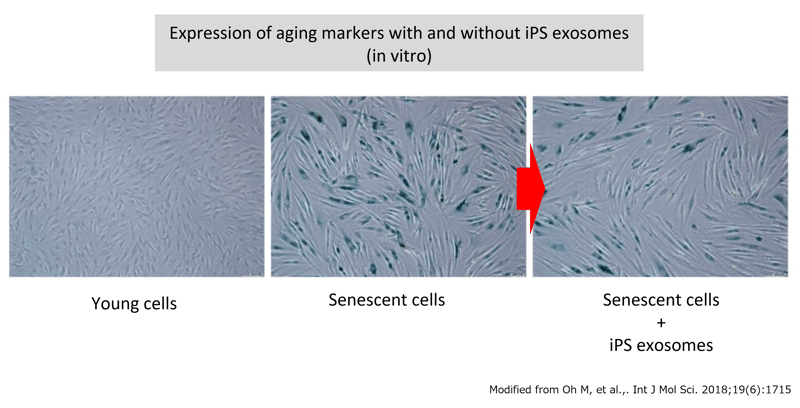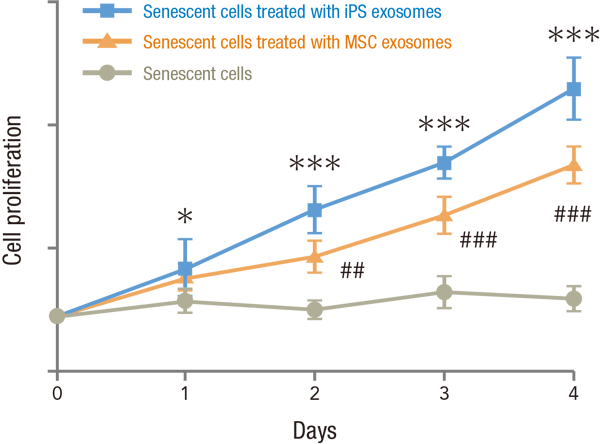Frequently Asked Questions: iPSC Exosomes - Preclinical Research Overview
Exosomes derived from iPSCs are being actively studied for their unique ability to influence cellular health and regenerative processes. Below are some frequently asked questions about their potential applications, with insights drawn from published scientific research.
Can iPSC exosomes help reduce cellular aging?
Yes. Fibroblasts, the connective tissue cells that produce collagen, tend to stop dividing as they age in long-term culture. This process can be tracked by markers such as β-galactosidase (β-gal). Published studies have shown that when aging fibroblasts are treated with iPSC exosomes, levels of β-gal are reduced. This suggests that iPSC exosomes may help maintain cell vitality and delay cellular senescence. (Ref. 1)

Can iPSC exosomes help maintain collagen production in fibroblasts?
Yes. As fibroblasts age, they gradually lose their ability to produce collagen, which is critical for skin elasticity and tissue repair. Research shows that aging fibroblasts cultured over time experience this decline. However, treatment with iPSC exosomes has been shown to help sustain collagen production, supporting healthier, more resilient cells. (Ref. 1)
-png.png?width=2000&name=Maintenance%20of%20collagen%20levels%20in%20senescent%20cells%20(in%20vitro)-png.png)
Can iPSC exosomes protect fibroblasts from UV damage?
Yes. UV exposure can harm fibroblasts by reducing both their numbers and their ability to produce collagen. Studies demonstrate that fibroblasts treated with iPSC exosomes maintain their cell numbers even after 48 hours of UV exposure, highlighting a protective effect against UV-induced cellular damage. (Ref. 1)
-png.png?width=700&height=555&name=Protective%20effect%20of%20iPS%20exosomes%20against%20UV-induced%20cell%20damage%20(in%20vitro)-png.png)
Can iPSC exosomes help maintain vascular structure under stress?
Yes. High blood sugar levels accelerate vascular aging, damaging blood vessel cells and disrupting their integrity. Research indicates that treating vascular cells with iPSC exosomes helps preserve cell numbers and maintain a healthy vascular structure, even under prolonged high-sugar conditions. (Ref. 2)
Can iPSC exosomes support cell proliferation?
Yes. As cells—including stem cells—age, they lose the ability to divide, and their growth slows down with repeated culture. Research demonstrates that treatment with iPSC exosomes can restore this proliferative capacity. Notably, iPSC exosomes have been shown to outperform MSC-derived exosomes in promoting cell growth. (Ref. 2, 3, 4)

Explore Relevant Webpages
- Understanding iPSC-derived Exosomes
- REPROCELL's iPSC-derived Exosomes
- REPROCELL Japan GMP Manufacturing Facility
References
- Oh, M., Lee, J., Kim, Y.J., Rhee, W.J. and Park, J.H. Exosomes Derived from Human Induced Pluripotent Stem Cells Ameliorate the Aging of Skin Fibroblasts. International Journal of Molecular Sciences. 19, 1715. 2018
- Ding, Q., Sun, R., Wang, P., Zhang, H., Xiang, M., Meng, D., Sun, N., Chen, A.F. and Chen, S. Protective effects of human induced pluripotent stem cell-derived exosomes on high glucose-induced injury in human endothelial cells. Experimental and therapeutic medicine. 15, 4791-4797. 2018
- Kim, S., Lee, S.K., Kim, H. and Kim, T.M. Exosomes Secreted from Induced Pluripotent Stem Cell-Derived Mesenchymal Stem Cells Accelerate Skin Cell Proliferation. International Journal of Molecular Sciences. 19, 2018.
- Liu, S., Mahairaki, V., Bai, H., Ding, Z., Li, J., Witwer, K.W. and Cheng, L. Highly Purified Human Extracellular Vesicles Produced by Stem Cells Alleviate Aging Cellular Phenotypes of Senescent Human Cells. Stem Cells. 37, 779-790. 2019
- Wang, S., Hou, Y., Li, X., Song, Z., Sun, B., Li, X. and Zhang, H. Comparison of exosomes derived from induced pluripotent stem cells and mesenchymal stem cells as therapeutic nanoparticles for treatment of corneal epithelial defects. Aging (Albany NY). 12, 19546-19562. 2020.


